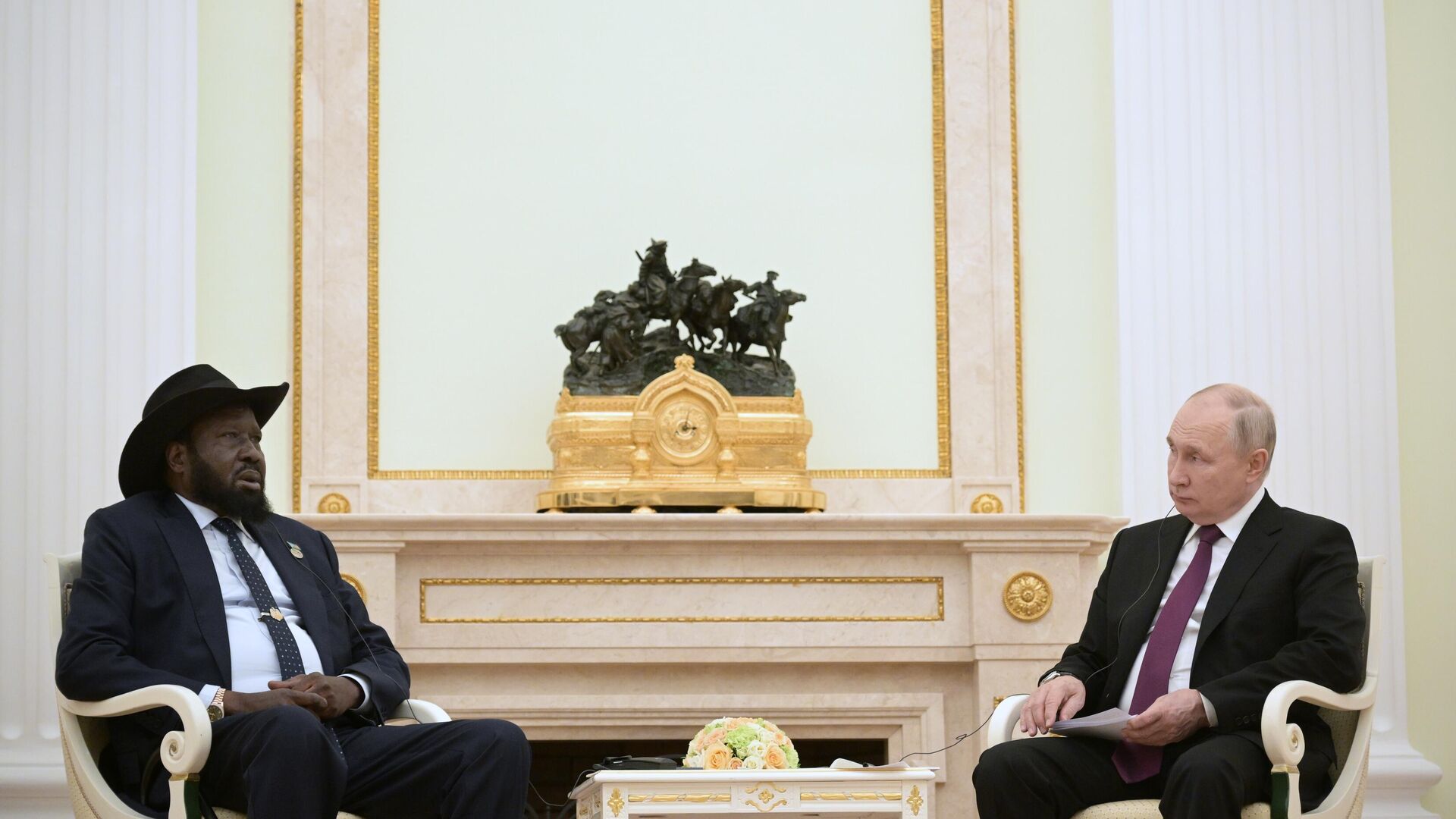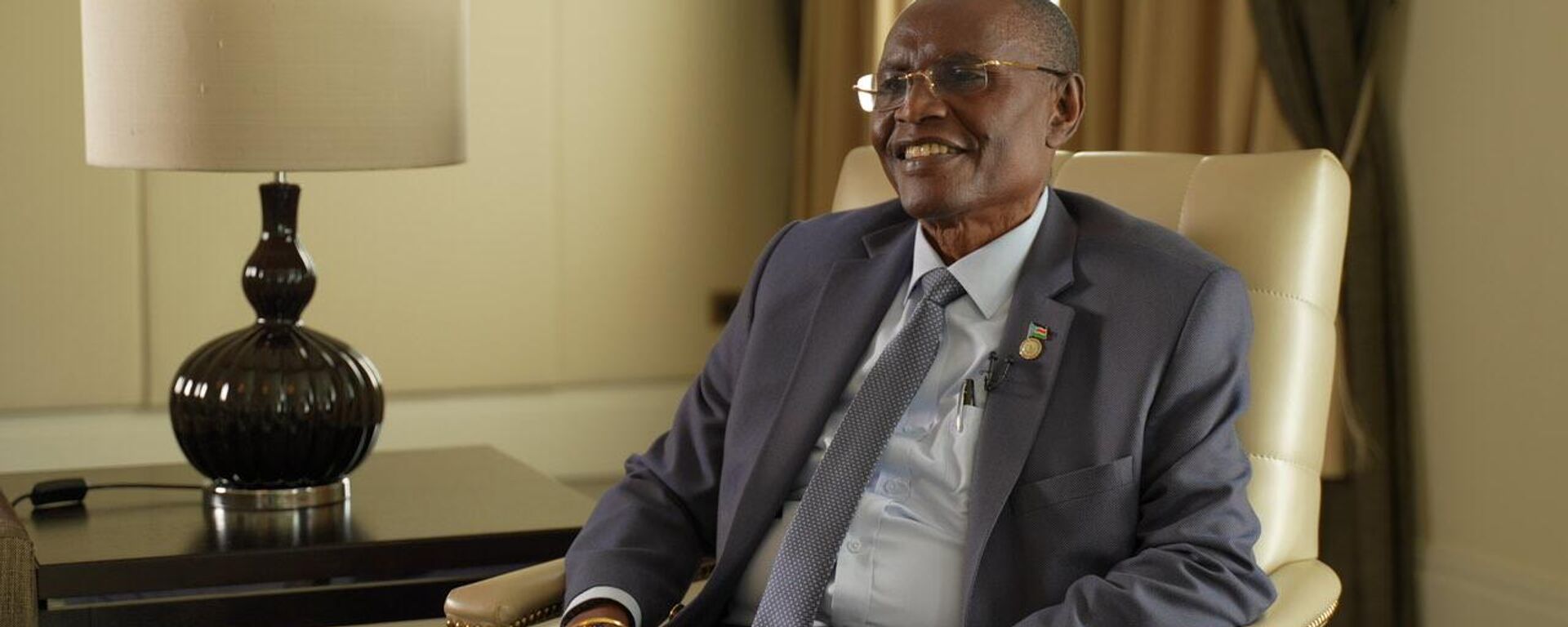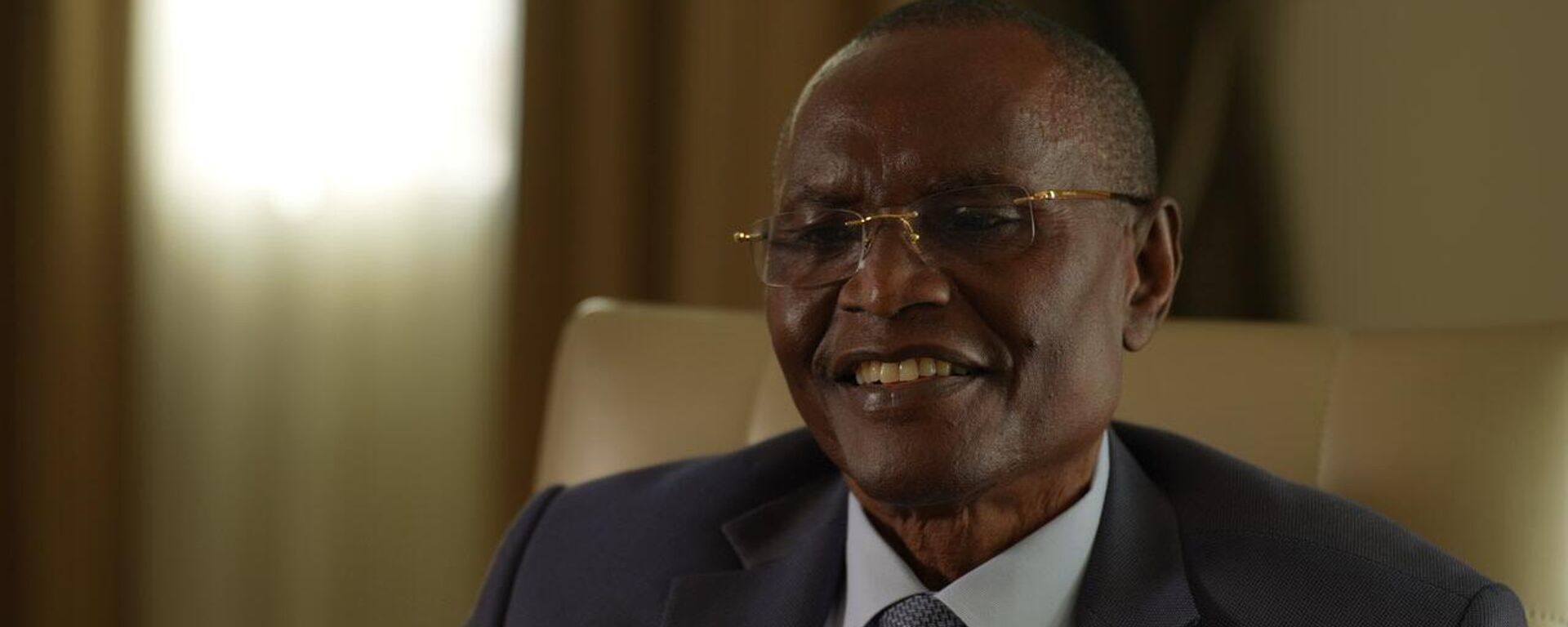https://en.sputniknews.africa/20230930/s-sudans-engagement-with-russia-is-not-picking-sides-but-mutual-respect-expert-1062451035.html
S. Sudan's Engagement With Russia is Not 'Picking Sides' But Mutual Respect: Expert
S. Sudan's Engagement With Russia is Not 'Picking Sides' But Mutual Respect: Expert
Sputnik Africa
This week, South Sudanese President Salva Kiir visited Russia for the first time, on a two-day trip to Moscow in which he met with Russian leader Vladimir... 30.09.2023, Sputnik Africa
2023-09-30T15:33+0200
2023-09-30T15:33+0200
2023-09-30T15:41+0200
opinion
africa insight
south sudan
salva kiir
russia
russia-africa cooperation
vladimir putin
east africa
sudan
brics
https://cdn1.img.sputniknews.africa/img/07e7/09/1e/1062451106_0:188:3306:2048_1920x0_80_0_0_65a2ec08a8f79e6efb73747eb8de8b9f.jpg
South Sudan is not taking a side in the world arena, since any country can collaborate with Juba on the issues they have in common, peace and security expert and political analyst Maluil Bol Kiir told Sputnik Africa.The country's engagement with Russia is firstly based on the principle of mutual respect and respect for each other's values, he added.Speaking about this week's official visit and, in particular, the South Sudanese president's statement that Juba does not see any alternative besides Russia as a friend on the international arena, the expert asserted that for the nation, "it's not like they are giving themselves a side in this international arena that is going on around international politics."He further noted that there is likely common ground for Juba-Moscow cooperation, given that "Russia is the country that helped so many revolutions in the continent," meaning the Soviet Union's help to African nations with their struggle for independence from colonial rule.Evaluating the overall results of Kiir's visit to Moscow, the expert said that he believed the meeting was part of "a normal bilateral conversation that any country can have with whichever country they choose to engage with."Asked by Sputnik Africa to provide his assessment of the second Russia-Africa Summit held this summer, the analyst, who himself was at the event in Saint Petersburg, said that for South Sudan, it was "like a starting point and a learning point [...] and for the continent to learn and to share ideas and experiences from Russia."Then, he said, one of the Russian corporations also reportedly traveled to South Sudan and obtained a contract after the conference in Russia.Speaking about the security issues and the negotiations on this topic with Putin, the expert said that Russia, "as advanced in terms of technology and modern advancement" can provide Juba with its experience, and the necessary means to ensure the security of a young African country.Furthermore, Kiir pointed out that the trade in national currencies, which also was discussed by the South Sudanese and Russian leaders, could not only work well for Juba, but the entire continent, since there is practically no need to "to bring in the US dollar in the middle" for the trade operations outside of Washington's sphere of interest.At the meeting, Putin also pointed out that there are many favorable opportunities to strengthen ties between South Sudan and Russia in different fields, including energy. The analyst stressed that Russia is indeed is "advanced" not only in energy, but in various different fields, and "it would be a good idea," if Russia helps the South Sudanese by "equipping them with the capacity to also come and develop this country."Kiir concluded this thought by adding that given the young age of South Sudan as an independent nation, it is "willing to learn to engage with any country that is willing to work with them based on all the things that are shared and the commonalities of the two countries."In an exclusive interview with Sputnik Africa, the country's Foreign Minister James Pitia Morgan said that at the negotiations, Russian companies have been asked to explore the nation's natural resources in different ways, including to search for oil.In August, the South Sudanese president said his country was interested in joining BRICS. He also said that South Sudan was looking for assistance in developing its agriculture and industry.
https://en.sputniknews.africa/20230929/south-sudanese-fm-praises-presidents-historical-visit-to-russia-1062437805.html
https://en.sputniknews.africa/20230930/south-sudan-invites-russian-companies-to-explore-for-oil-1062450478.html
south sudan
russia
east africa
sudan
Sputnik Africa
feedback@sputniknews.com
+74956456601
MIA „Rossiya Segodnya“
2023
News
en_EN
Sputnik Africa
feedback@sputniknews.com
+74956456601
MIA „Rossiya Segodnya“
Sputnik Africa
feedback@sputniknews.com
+74956456601
MIA „Rossiya Segodnya“
africa insight, south sudan, salva kiir, russia, russia-africa cooperation, vladimir putin, east africa, sudan, brics
africa insight, south sudan, salva kiir, russia, russia-africa cooperation, vladimir putin, east africa, sudan, brics
S. Sudan's Engagement With Russia is Not 'Picking Sides' But Mutual Respect: Expert
15:33 30.09.2023 (Updated: 15:41 30.09.2023) Kirill Kurevlev
Managing Editor
This week, South Sudanese President Salva Kiir visited Russia for the first time, on a two-day trip to Moscow in which he met with Russian leader Vladimir Putin to discuss the situation in the world and mutual relations, as well as prospects for their deepening.
South Sudan is not taking a side in the world arena, since any country can collaborate with Juba on the issues they have in common, peace and security expert and political analyst Maluil Bol Kiir told Sputnik Africa.
The country's engagement with Russia is firstly based on the principle of mutual respect and respect for each other's values, he added.
Speaking about this week's official visit and, in particular, the South Sudanese president's statement that Juba does not see any alternative besides Russia as a friend on the international arena, the expert asserted that for the nation, "it's not like they are giving themselves a side in this international arena that is going on around international politics."
"South Sudan can work together with any nation on the things that they share and then things that they have in common, things that they wish to do together," he told Sputnik Africa. "South Sudan's government is willing to work with Russia on things based on the principle of mutual respect, mutual understanding, respecting the values of different and also respecting the sovereignty of this country. So I think it's okay to go on to the things that they believe are common to both of them."
He further noted that there is likely common ground for Juba-Moscow cooperation, given that "Russia is the country that helped so many revolutions in the continent," meaning the Soviet Union's help to African nations with their struggle for independence from colonial rule.
Evaluating the overall results of Kiir's visit to Moscow, the expert said that he believed the meeting was part of "a normal bilateral conversation that any country can have with whichever country they choose to engage with."
Asked by Sputnik Africa to provide his assessment of the second Russia-Africa Summit held this summer, the analyst, who himself was at the event in Saint Petersburg, said that for South Sudan, it was "like a starting point and a learning point [...] and for the continent to learn and to share ideas and experiences from Russia."
"I think in terms of South Sudan and Russia, there has been a bit of results from the summit, the expert said. "Like recently, there has been an agreement signed by one of the Russian companies and South Sudan. They had an MOU [memorandum of understanding] just after the summit in Russia, where the South Sudan delegation was headed by the Vice-President General Taban Deng Gai."
Then, he said, one of the Russian corporations also reportedly traveled to South Sudan and obtained a contract after the conference in Russia.
"So I think there are [...] conversations, which I believe they can work on things that they believe are common to both countries," the analyst said.
Speaking about the security issues and the negotiations on this topic with Putin, the expert said that Russia, "as advanced in terms of technology and modern advancement"
can provide Juba with its experience, and the necessary means to ensure the security of a young African country.
"So South Sudan can learn some of the best practices and maybe gain necessary skills if they so wish from Russia for South Sudan to develop itself as well," he added.
Furthermore, Kiir pointed out that the trade in national currencies, which also was discussed by the South Sudanese and Russian leaders, could not only work well for Juba, but the entire continent, since there is practically no need to "to bring in the US dollar in the middle" for the trade operations outside of Washington's sphere of interest.
"Trending in national currencies not only benefits South Sudan, it benefits the region, and it benefits the continent because of bringing a different currency. Why should the US currency be in the middle of trade? You know, if South Sudan is trading with the US, that is no problem using US dollars. But if South Sudan is trading with any other country, it's not right for the US dollar to come in between some of this business competition. So I think it is a good idea," he said.
At the meeting, Putin also pointed out that there are many favorable opportunities to strengthen ties between South Sudan and Russia in different fields, including energy. The analyst stressed that Russia is indeed is "advanced" not only in energy, but in various different fields, and "it would be a good idea," if Russia helps the South Sudanese by "equipping them with the capacity to also come and develop this country."
"So if there are investors or partners from Russia who are willing to help South Sudan to develop some of the sectors, including energy, it would be a good idea as well as also to share those skills and to maybe take South Sudanese, give them the necessary skills, equip them with the capacity to also come and develop this country," he elaborated. "So whatever help that South Sudan and Russia agree on, it should be based on mutual understanding, but also to give the people of South Sudan, the government of Sudan, the necessary skills to also develop some of the sectors."
Kiir concluded this thought by adding that given the young age of South Sudan as an independent nation, it is "willing to learn to engage with any country that is willing to work with them based on all the things that are shared and the commonalities of the two countries."
In an exclusive interview with Sputnik Africa, the country's Foreign Minister James Pitia Morgan said that at the negotiations, Russian companies have been asked to explore the nation's natural resources in different ways, including to search for oil.
In August, the South Sudanese president said his country was interested in joining BRICS. He also said that South Sudan was looking for assistance in developing its agriculture and industry.



